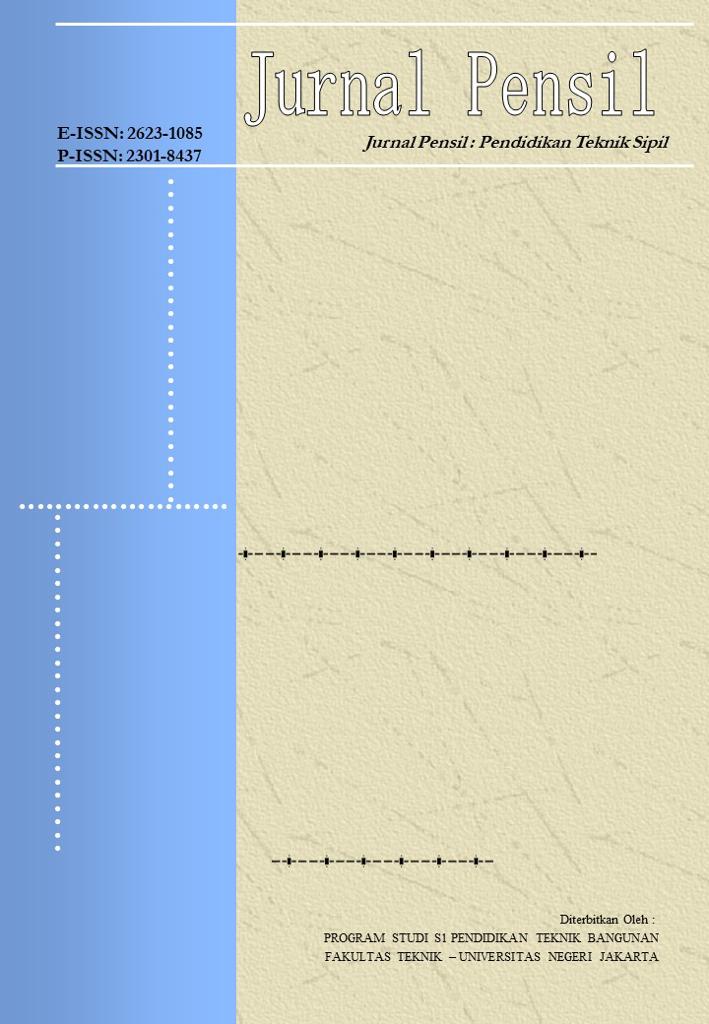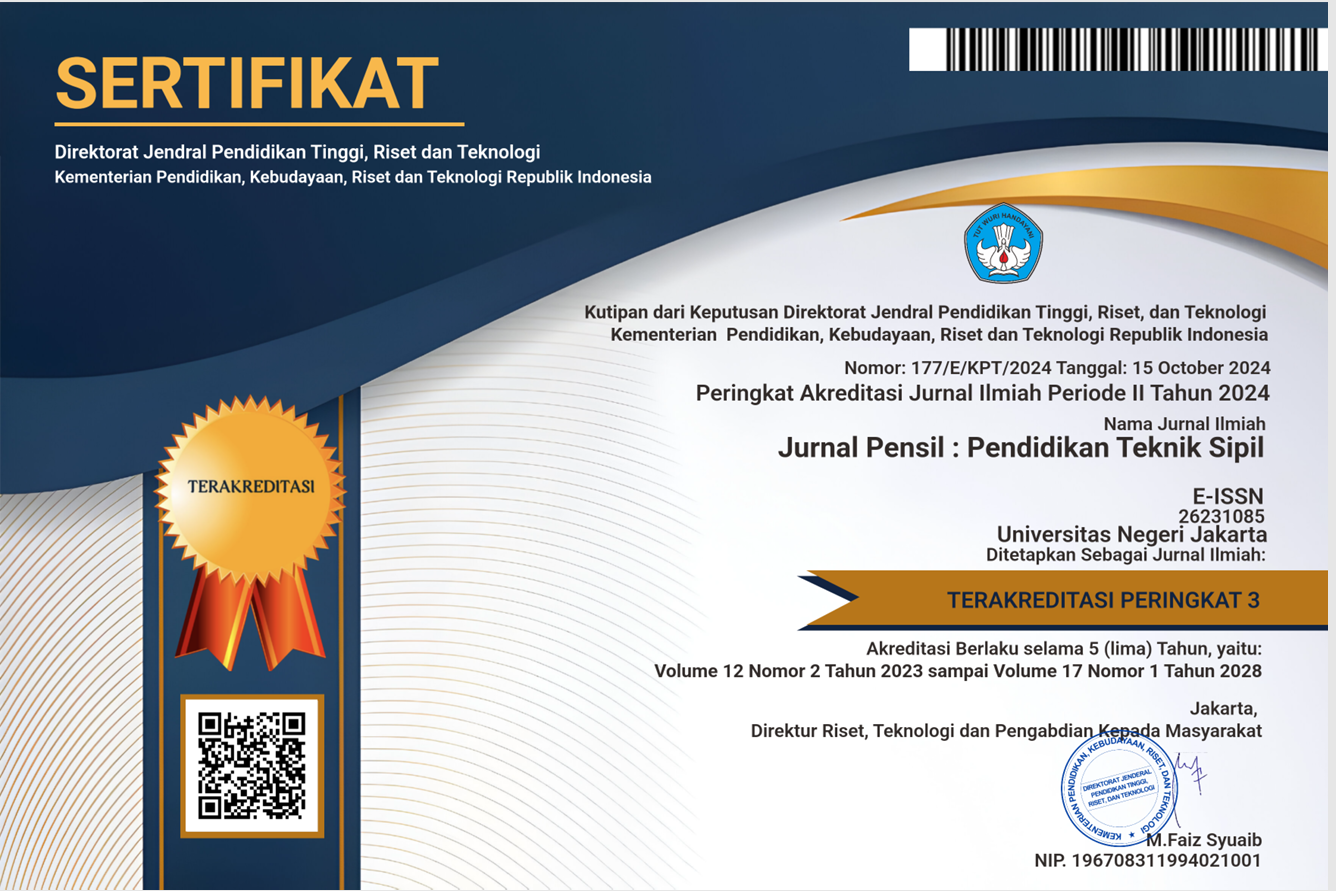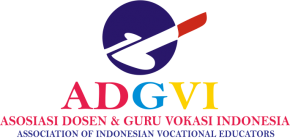IMPLEMENTATION OF AN ENTREPRENEURSHIP LEARNING MODEL IN THE CREATIVE PRODUCT AND ENTREPRENEURSHIP COURSE FOR VOCATIONAL HIGH SCHOOLS
DOI:
https://doi.org/10.21009/jpensil.v13i3.43995Keywords:
Learning Model, EkRenFaTiHa, EntrepreneurshipAbstract
The learning model is one of the main factors that need to be considered in the learning process. This study aims to reveal the effect of applying the “EkRenFaTiHa” entrepreneurship learning model in vocational high schools. The research design is quasi-experimental. Determination of the sample using the purposive sampling technique. Data collection techniques using observation, documentation, and tests the prerequisite tests carried out are validity tests, reliability tests, normality tests, and hypothesis tests. The research location was in class XI at one of the state vocational schools in the Province of DIY. It was agreed with the school that it was not permissible to mention the name of the school, so the research location was named X’s vocational high schools. The results of the hypothesis testing showed that the cognitive value in the experimental class was significant, which was 0.001, where the value was < 0.05. This means that the “EkRenFaTiHa” entrepreneurship learning model can have a significant influence on student learning outcomes in the subject of creative products and entrepreneurship. While the value of product results in the experimental class is still higher than in the control class. The experimental class got an average product value of 75.455, while the control class average product value was 74.773.
References
Afifah, A. (2020). Pengembangan E-Modul Pada Mata Kuliah Kompetensi Pembelajaran di Program Studi Pendidikan Teknik Bangunan, Universitas Negeri Jakarta. Jurnal PenSil: Pendidikan Teknik Sipil, 9(2), 122–129. https://doi.org/10.21009/jpensil.v9i2.11950
Akhmad, K. A. (2021). Peran Pendidikan Kewirausahaan untuk Mengatasi Kemiskinan. Intelektiva: Jurnal Ekonomi, Sosial & Humaniora, 2(6), 173–181. https://www.jurnalintelektiva.com/index.php/jurnal/article/view/419
Amin, P., Arini, D. U., & Permadi, W. B. (2020). Memetakan Bakat dan Minat Siswa dengan Membangun Mental Wirausaha Guna Mendukung Program Ekonomi Kreatif Di Lingkungan Sekolah. Jurnal Masyarakat Mandiri, 4(2), 308–318. https://doi.org/https://doi.org/10.31764/jmm.v4i2.2089
Arifin, N. (2020). Pemikiran Pendidikan John Dewey. As-Syar’i: Jurnal Bimbingan & Konseling Keluarga, 2(2), 168-183. https://doi.org/10.47467/as.v2i2.128
Azhar. (2011). Model Pembelajaran Kewirausahaan pada PKBM Binaan SKB Kabupaten Temanggung. Jurnal Kependidikan, 41(1), 11–22.
Boldureanu, G., Ionescu, A. M., Bercu, A.-M., Bedrule-Grigoruta, M. V., & Boldureanu, D. (2020). Entrepreneurship Education through Successful Entrepreneurial Models in Educational Institutions. Sustainability, 09(14), 1–33. https://doi.org/doi:10.3390/su12031267
Darmawan, I. (2021). Menumbuhkan Minat Berwirausaha Mahasiswa Melalui Pendidikan Kewirausahaan Berbasis Caring Economics. Jurnal Ekonomi Dan Pendidikan, 18(1), 9–16. https://doi.org/10.21831/jep.v18i1.40035
Depdiknas. (2003). Undang-Undang Republik Indonesia Nomor 20 Tahun 2003 tentang Sistem Pendidikan Nasional. Jakarta.
Dewi, M., Rukun, K., & Efi, A. (2018). Exspert Validity pada Pengembangan Model Pembelajaran Berbasis Proyek E Commerce pada Pembelajaran Kewirausahaan. Jurnal Pendidikan Teknologi Kejuruan, 1(2), 43–50. https://doi.org/10.24036/jptk.v1i2.923
Diandra, D. (2019). Program Pengembangan Kewirausahaan untuk Menciptakan Pelaku Usaha Sosial yang Kompetitif. Prosiding Industrial Research Workshop and National Seminar, 10(1), 1340–1347. https://doi.org/https://doi.org/10.35313/irwns.v10i1.1424
Fitria, N. N., Tanuatmodjo, H., & Kurjono. (2022). Analisis Minat Berwirausaha Melalui Pembelajaran Kewirausahaan dan Perceived Behavior Control. Journal of Finance, Entrepreneurship, and Accounting Education Research, 1(1), 63–74.
Harefa, D., Sarumaha, M., Fau, A., Telaumbanua, T., Hulu, F., Telaumbanua, K., Lase, I. P. S., Ndruru, M., & Ndraha, L. D. M. (2022). Penggunaan Model Pembelajaran Kooperatif Tipe Jigsaw terhadap Kemampuan Pemahaman Konsep Belajar Siswa. Aksara: Jurnal Ilmu Pendidikan Nonformal, 8(1), 325–332. https://doi.org/10.37905/aksara.8.1.325-332.2022
Harnani, N., Amijaya, D. T., & Setiadiwibawa, L. (2020). Model Pembelajaran Kewirausahaan Kreatif Melalui Praktek Usaha dalam Menumbuhkan Kreatifitas dan Inovatif Mahasiswa. Sosiohumaniora - Jurnal Ilmu-Ilmu Sosial Dan Humaniora, 22(1), 79–87. https://doi.org/10.24198/sosiohumaniora.v22i1.24510
Herdiansyah, R. F. P. ., Dewi, D. A. ., & Furnamasari, Y. F. . (2021). Membangun Karakter Siswa Sekolah Dasar Melalui Pendidikan Kewarganegaraan. Jurnal Pendidikan Tambusai, 5(3), 7176–7181. https://doi.org/10.31004/jptam.v5i3.2108
Kaban, R. H., Anzelina, D., Sinaga, R., & Silaban, P. J. (2021). Pengaruh Model Pembelajaran PAKEM terhadap Hasil Belajar Siswa Di Sekolah Dasar. Jurnal Basicedu, 5(1), 102–109. https://doi.org/10.47178/elementary.v6i1.2056
Khamimah, W. (2021). Peran Kewirausahaan Dalam Memajukan Perekonomian Indonesia. Jurnal Disrupsi Bisnis, 4(3), 228–240. https://doi.org/10.32493/drb.v4i3.9676
Kurniawati, F. N. A. (2022). Meninjau Permasalahan Rendahnya Kualitas Pendidikan di Indonesia dan Solusi. Academy of Education Journal, 13(1), 1–13. https://doi.org/10.47200/aoej.v13i1.765
Lastariwati, B. (2013). Uji Coba Model Pembelajaran Kewirausahaan Produktif Untuk Sekolah Menengah Kejuruan Program Studi Pariwisata Bidang Keahlian Tata Boga. In Universitas Negeri Yogyakarta, Yogyakarta (Issue November).
Lastariwati, B. (2015). Mewujudkan Generasi Emas yang Kreatif dan Inovatif dengan Pembelajaran Kewirausahaan Produktif EkRenFaTiHa di SMK Tata Boga. Prosiding Pendidikan Teknik Boga Busana FT UNY.
Lastariwati, B. (2014). Perubahan Perilaku Kewirausahaan Siswa pada Penerapan Model Pembelajaran Kewirausahaan Produktif EkRenFaTiHa untuk SMK Tata Boga. Seminar Nasional 2014 “Prospek Pendidikan Vokasi Dan Industri Kreatif Indonesia Menghadapi Masyarakat Ekonomi ASEAN,” 134–152.
Lastariwati, B., Pardjono, P., & Sukamto, S. (2016). Students’ entrepreneurial behavior in the application of “EkRenFaTiHa” productive entrepreneurial teaching model at culinary programs vocational schools. REID (Research and Evaluation in Education), 2(1), 53–70. https://doi.org/10.21831/reid.v2i1.6528
Lee, S. M., Lim, S. B., Pathak, R. D., Chang, D., & Li, W. (2006). Influences on students attitudes toward entrepreneurship: A multi-country study. International Entrepreneurship and Management Journal, 2(3), 351–366. https://doi.org/10.1007/s11365-006-0003-2
Malik, A., Ikhwanuddin, Prihadi, W. R., Syamsudin, R. N., & Wijaya, E. P. (2024). Increasement Entrepreneurial Values in SMK Muhammadiyah 3 Yogyakarta in The Field of Building and Information Design Expertise Students with Implementation of “ EkRenFaTiHa ” Learning Model. International Journal of Economics, Business and Accounting Research (IJEBAR), 8(2), 527–536.
Marsono, S., Sulistyani, L., & Lathifah, I. (2020). Pelatihan Kewirausahaan dalam Mewujudkan Kemandirian Ekonomi bagi Siswa Sekolah Menengah Kejuruan (SMK) PGRI di Surakarta. Wasana Nyata: Jurnal Pengabdian Kepada Masyarakat, 4(2), 131–136. https://doi.org/10.36587/wasananyata.v4i2.748
Mopangga, H. (2014). Faktor Determinan Minat Wirausaha Mahasiswa Fakultas Ekonomi dan Bisnis Universitas Negeri Gorontalo. Trikonomika, 13(1), 78–90. https://doi.org/10.23969/trikonomika.v13i1.486
Mukhlason, A., Winanti, T., & Yundra, E. (2020). Analisa Indikator SMK Penyumbang Pengangguran Di Provinsi Jawa Timur. Journal of Vocational and Technical Education (JVTE), 2(2), 29–36. https://doi.org/10.26740/jvte.v2n2.p29-36
Parawangsa, E. ., Dewi, D. A. ., & Furnamasari, Y. F. . (2021). Hakikat Pendidikan Kewarganegaraan di Sekolah Dasar (SD). Jurnal Pendidikan Tambusai, 5(3), 8050–8054. https://doi.org/10.31004/jptam.v5i3.2297
Presiden Republik Indonesia Presidential Instruction, I. (2010). Instruksi Presiden Republik Indonesia Nomor 1 Tahun 2010. In Peraturan Pemerintah Republik Indonesia Nomor 26 Tahun 1985 Tentang tentang Percepatan Pelaksanaan Prioritas Pembangunan Nasional Tahun 2010.
Prihadi, W. R., Malik, A., & Suparman, S. (2021). Implementasi Pembelajaran Kewirausahaan SMK Bidang Keahlian Teknik Konstruksi dan Properti Di Yogyakarta. Jurnal Pensil: Pendidikan Teknik Sipil, 10(1), 21–33. https://doi.org/10.21009/jpensil.v10i1.18441
Rahim, A. R., & Basir, B. (2019). Peran Kewirausahaan dalam Membangun Ketahanan Ekonomi Bangsa. Jurnal Economic Resource, 2(1), 34–39. https://doi.org/10.33096/jer.v1i2.160
Rapii, M. (2019). Mengukur Potensi Wirausaha pada Program Pelatihan Kewirausahaan Mahasiswa Pendidikan Ekonomi. JMK (Jurnal Manajemen Dan Kewirausahaan), 4(2), 126–135. https://doi.org/http://dx.doi.org/10.32503/jmk.v4i2.487
Riswani, E. F., & Widayati, A. (2012). Model Active Learning Dengan Teknik Learning Starts With a Question Dalam Peningkatan Keaktifan Peserta Didik Pada Pembelajaran Akuntansi Kelas Xi Ilmu Sosial 1 SMA Negeri 7 Yogyakarta Tahun Ajaran 2011/2012. Jurnal Pendidikan Akuntansi Indonesia, 10(2), 1–21. https://doi.org/10.21831/jpai.v10i2.910
Ruswati, I. (2018). Faktor Eksternal dan Faktor Internal terhadap Minat Berwirausaha pada Siswa SMK Yayasan Pendidikan Islam Darussalam Cerme Gresik. JRE: Jurnal Riset Entrepreneurship, 1(2), 38–52. https://doi.org/10.30587/jre.v1i2.415
Sanga, L. D. ., & Wangdra, Y. (2023). Pendidikan Adalah Faktor Penentu Daya Saing Bangsa. Prosiding Seminar Nasional Ilmu Sosial Dan Teknologi (SNISTEK), 5, 84–90. https://doi.org/10.33884/psnistek.v5i.8067
Sari, A. I. C., Karlina, E., & Rasam, F. (2021). Peran Pendidikan Kewirausahaan dan Motivasi Berwirausaha dalam Menumbuhkan Sikap Mental Kewirausahaan Peserta Didik. Research and Development Journal of Education, 7(2), 403–412. https://doi.org/10.30998/rdje.v7i2.10287
Sugiyono. (2007). Statistik Untuk Penelitian. In CV Alfabeta.
Syaadah, R., Ary, M. H. A. A., Silitonga, N., & Rangkuty, S. F. (2022). Pendidikan Formal, Pendidikan Non Formal dan Pendidikan Informal. Pema (Jurnal Pendidikan Dan Pengabdian Kepada Masyarakat), 2(2), 125–131. https://doi.org/10.56832/pema.v2i2.298
Wahyuningsih, R. (2020). Pengaruh Pendidikan Kewirausahaan dan Lingkungan Keluarga terhadap Minat Berwirausaha Mahasiswa STKIP PGRI Jombang. Jurnal Kependidikan: Jurnal Hasil Penelitian Dan Kajian Kepustakaan Di Bidang Pendidikan, Pengajaran Dan Pembelajaran, 6(3), 512–521. https://doi.org/10.33394/jk.v6i3.2874
Wardhani, P. S. N., & Nastiti, D. (2023). Implementasi Pendidikan Kewirausahaan dalam Menumbuhkan Minat Berwirausaha Mahasiswa. Prima Magistra: Jurnal Ilmiah Kependidikan, 4(2), 177–191. https://doi.org/10.37478/jpm.v4i2.2622
Wu, T. J., & Tai, Y. N. (2016). Effects of multimedia information technology integrated Multi-Sensory instruction on students’ learning motivation and outcome. Eurasia Journal of Mathematics, Science and Technology Education, 12(4), 1065–1074. https://doi.org/10.12973/eurasia.2016.1552a
Downloads
Published
How to Cite
Issue
Section
License
Copyright (c) 2024 Rudi Nur Syamsudin, Ikhwanuddin Ikhwanuddin, Wisnu Rachmad Prihadi, Abdul Malik

This work is licensed under a Creative Commons Attribution-ShareAlike 4.0 International License.











.png)
.png)
1.png)

